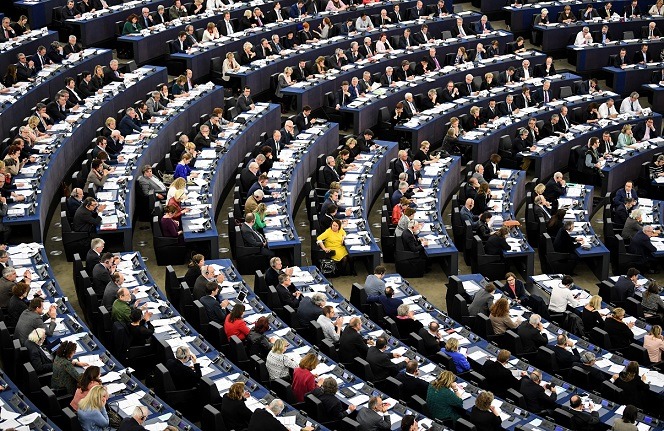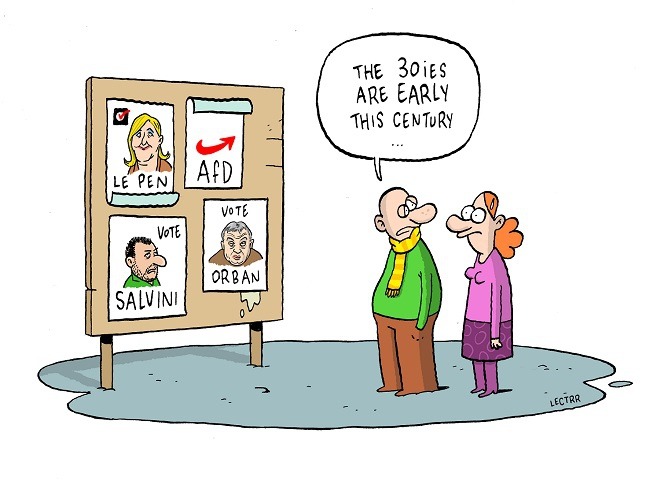The election of the European Parliament is arguably the standout EU event this year but also the one that many fear the most. The elections will be held on 23–26 May when European citizens will have the chance to decide the future of the European Union. This year will also bring some of the toughest challenges for the EU. Unless a miracle happens at the last minute, the United Kingdom will leave the EU on 29 March with or without a deal, after more than 45 years as a member state.
The number of MEPs will go down from the current 751 to 705, with 46 of the 73 UK seats available for possible EU enlargement in the Western Balkans somewhere down the line. The remaining 27 UK seats will be shared out among 14 other member states, which are currently viewed as under-represented.
Lead candidates
The European elections are the world’s second-biggest parliamentary election. For the EU, the elections will result in job swaps in the highest positions, such as the President and the 27 Commissioners in the European Commission, the Vice-President and High Representative of the Union for Foreign Affairs and Security Policy, the European Council President and the European Central Bank President.
The Treaty of Lisbon states that the result of the European elections should be taken into account by the European Council, when it proposes a candidate for the post of European Commission President (currently held by Jean-Claude Juncker, a former Luxembourg Prime Minister, who will not stand again).

With the UK on the exit, the number of MEPs will go down from the current 751 to 705. 46 of the 73 UK seats will be made available for a possible future EU enlargement in the Western Balkans. The remaining 27 UK seats will be shared out among 14 other member states, which are currently viewed as under-represented.
Each political group in the European Parliament nominates a lead candidate for the position of Commission President before the elections, with the candidate from the most-voted-for political group expected to be nominated by the Council and supported by the Parliament for the post. However, the process is not automatic and the Council can appoint someone else.
In the run-up to the elections, most of the parties have named their candidates for the post of Commission president. The European People’s Party (EPP), currently by far the biggest grouping in parliament with 221 seats (29 per cent of the total), has named German MEP Manfred Weber as its candidate. He also has the support of German chancellor Angela Merkel.
The Socialists and Democrats (S&D), currently with 191 seats (25 per cent), has named Frans Timmermans as its lead candidate. The Dutch politician is currently First Vice-President of the European Commission, a position he had held since 2014 when the current Commission was appointed.
Different voices
The outcome is still uncertain but there is a consensus that populist-nationalist parties are expected to make gains in the elections, putting into question the next phase of European integration.
According to a recent Eurobarometer poll, EPP started 2019 with its biggest poll lead over S&D in more than a year. The projected gap is now around 50 seats, with the EPP at around 180 seats out of 705 in the new Parliament, and the Socialists at around 130. If that happens, it will translate into a vote share of 26 percent for the EPP and 18 percent for S&D.
It’s no secret that Matteo Salvini, Italy’s deputy prime minister and minister of the interior, is looking to build a new nationalist alliance to replace the divided collection of Eurosceptic forces in the European Parliament. But Denis McShane, a former Europe Minister in the UK, told The Brussels Times, “This may prove an illusion as the populist and rightist nationalist parties don’t form a coherent block. The right is divided on many issues.”
McShane said: “We’ll see a number of new entrants. Many of the new 21st century political formations, such as green parties, Podemos (Spain), die Linke (Germany), La France Insoumise (LFI), Syriza (Greece), and nationalist parties like SNP (Scotland) are on the left and opposed to the far-right world view.”
He added that there is also a lot of anti-government feeing in Poland and Hungary, which are ruled by Eurosceptic parties and that may be reflected in the European elections which are usually protest votes against the government in power.
“It’s true that the parties of the big three formations in the European Parliament until now (EPP, S&D and the liberal alliance ALDE) are in decline but with 14 minority governments in EU member states that is the new direction of travel.”
“The big test for the European Parliament is whether participation will continue to decline with fewer than two out of five voters bothering to cast a vote in the elections.” McShane, a seasoned and experienced EU observer, warns, “A parliament that cannot get people to vote for it has a big question of legitimacy.”
Polish MEP Danuta Huebner (EPP), a former Commissioner, is more worried about the outcome of the elections: "I don’t want to sound overly melodramatic, but the Parliament is one of the crucial sites of resistance to the populist forces and, for the health of European democracy, it has to stay that way,” she says.
"We know now that 25 % of Europeans vote for populist parties. This is staggering, when compared with the 7 % the populists polled in 1998. Getting over 25 % may mean that populist parties will cross a threshold of legitimacy - no longer being just a disrupter but a valid political actor in the new political arrangement after the election.”
The party group European Conservatives and Reformists (ECR), backed by populist - nationalist parties, could end up being the biggest group. New alliances are being formed among the Eurosceptics of the Parliament. For instance, the ECR have joined forces with Debout la France to form what is described as a ‘Euro-realist’ group.
Currently, ECR is the 3rd largest group in Parliament, with 74 MEPs representing 19 countries. ECR includes several government or major parties such as the Law and Justice Party in Poland, the New Flemish Alliance (N-VA) in Belgium, the Civic Democratic Party (ODS) in the Czech Republic, the Sweden Democrats and the Danish People’s Party.
Nicolas Dupont-Aignan, a member of the National Assembly in France and a candidate in 2017 in the French presidential election, said: "For the first time since the start of direct elections to the European Parliament, Euro-realist political forces can be the majority in the European Parliament and finally put these institutions at the service of the people.”
Hungarian PM Viktor Orban has called for “anti-immigration forces” to seize power in the European elections and warned of two civilisations in Europe - one Christian, the other mixed Islamic. Populist leaders are often portrayed as dedicated to the destruction of the EU, with harsh words for Brussels and displays of affection for leaders like Vladimir Putin.
MEP Paul Nuttall, former leader of the UK Independence Party that campaigned for Brexit, said, "It would be a wonderful thing for Europe if a high number of national democrats and Eurosceptics got into the European Parliament to change its make-up and dynamic.”
But Alexander Clarkson, a lecturer in European studies at King’s College London, does not believe that populist forces want to bring down the EU but, rather, seek to try to work the EU system to their advantage.
Many await the elections with bated breath, fearing the impact populist - nationalist parties will have both on the outcome of the elections and their subsequent influence in steering EU legislation over the next five years. This is well summarised by Linnea Engstrom, a Swedish Greens MEP, who told The Brussels Times, “I feel frightened by the rise of populist parties. We live in a time where we need brave politicians with well thought-through policies.”
“Climate change and migration will need European solidarity and a just transition where no one is left behind. What are the populist answers to these complex issues? They’re just presenting fake solutions that creates a wall of fog for the voters,” she added.
| Fake news and voter turnout In this age of fake news, the parliament has already moved to try to ensure that the elections remain tamper-free. New provisions are aimed at protecting the electoral process from online disinformation campaigns based on misuse of voters’ personal data. Another key challenge is to actually get people out to vote in May. Turnout has traditionally been low since the first direct election back in 1979. A new Eurobarometer poll found that only 47% of respondents recall having heard recently about the European elections in the media. In a bid to boost voter turnout, the European Economic Social Committee (EESC) and the European Parliament will undertake a number of activities in order to raise awareness among civil society organisations and the general public about the elections and to encourage participation. Three major awareness campaigns will be run to encourage EESC members to play an active role in the European elections' campaign. Luca Jahier, President of the EESC, backs the ThisTimeImVoting initiative, saying, "Understanding and embracing change will allow Europe to move forward and shape the global order for the 21st century.” For the first time, 48% of European citizens believe that “their voice counts in the EU”. Despite differences among member states, this represents an overall increase of 10 percent over the last ten years. What parliament has called a “ground-breaking new website” has also been launched, demonstrating the EU’s impact on individual citizens. Although 68% of respondents in the polls agree that their country has benefitted from EU membership, there have been very few attempts to list the concrete benefits of EU membership to ordinary people across the EU. The interactive, multilingual online website (www.what-europe-does-for-me.eu), put together by the European Parliamentary Research Service, presents hundreds of easy-to-read, one-page notes giving examples of the “positive difference that the EU makes to people's lives.” It outlines some of the achievements of the current parliamentary term, and the outlook for the future, with a special focus on public opinion and citizens’ concerns and expectations of EU action. |
By Martin Banks

